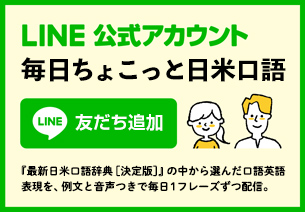在宅勤務の是非
『書く・話すための「引き出し」ができる 発信型の英語アイデアBOOK』(立川利治/レベッカ・クイン著)の中から「在宅勤務の是非」「食品ロス」「子どものスマホ使用」「死刑制度の廃止」「同性婚の合法化」など、身近なテーマをピックアップ。自分の意見を「英語」で伝えるスキルを具体的な例文と解説で紹介します。
<筋道をたてる ~時系列で整理するスキルを磨く>
今回のテーマ: 在宅勤務の是非 Employees Working from Home
英文
Recently, more and more companies are letting their employees work from home. What do you think about this?
In the past, the idea of working from home in Japan was unheard of. Japanese salarymen used to spend all their time at the office, often staying until the last train home.
Thanks to technology, this has changed in recent times. I think this is a good thing. Offices are noisy and busy. Working from home makes people less stressed and more productive.
I think people should be able to work from home at least one day a week.
Words and Phrases
□recently 最近、近年 □the last train 終電、最終列車
□more and more ますます □technology 科学技術、テクノロジー
□let ~することを許可する □noisy 騒々しい、うるさい
□employee 従業員 □busy にぎやかな、忙しい
□work from home 在宅勤務をする □stressed ストレスを受ける
□idea of ~という考え方 □productive 生産的な
□unheard of 前例のない □at least 少なくとも
日本語訳
最近、従業員の在宅勤務を認める会社が増えています。
あなたはこのことについてどう思いますか。
かつて日本には、在宅勤務という考え方はありませんでした。日本のサラリーマンはすべての時間を会社で過ごし、よく終電まで残っていました。
科学技術のおかげで、近年はこれが変わってきました。これは良いことだと思います。オフィスはうるさく、にぎやかです。在宅勤務は人々のストレスを減らし、生産性を上げてくれます。
私は、少なくとも週に1日は人々が在宅勤務をできるようにすべきだと思います。
▼使える機能表現
□thanks to (~のおかげで)理由・原因
□in recent times (近年は)時間
□I think (that) (~だと思います)意見
□ ... is a good thing. (…は良いことである)善悪
*****
スキル: 過去に言及する〈時系列で整理〉In the past ...
解説
文章を構成する方法の一つに、「過去→現在→未来」という流れで考える「時系列的思考法」があります。これは発信者の頭の中が整理されやすく、受信者にとっても、話の流れがスムーズで理解しやすくなります。
社会で生じている変化について意見を求められたときには、この時系列の発想で「過去」に焦点を当てることで、最近の変化の善し悪しについて、結論を導き出しやすくなります。
「過去に言及する」表現□used to / would ... 「~したものである」
Japanese salarymen used to spend all their time at the office.
(日本のサラリーマンはすべての時間を会社で過ごしていました)
The government would not listen to the people.
(政府は国民の声を聞こうとしませんでした)□In the past, 「過去に」
In the past, the idea of working from home in Japan was unheard of.
(かつて、日本には在宅勤務という考え方はありませんでした)□A long time ago, 「ずっと前に」
A long time ago, it was unimaginable for company employees to work from home.
(ずっと前には、企業の従業員にとって在宅勤務なんて想像できませんでした)□a few years ago 「数年前に」
There came a drastic change a few years ago.
(数年前に急激な変化が訪れました)□decades ago 「数十年前に」
This disease was considered incurable decades ago.
(数十年前、この病気は不治の病と考えられていました)□in the time of 「~の時代に」
In the time of imperialism, freedom of thought was severely restricted.
(帝国主義の時代には、思想の自由は厳しく規制されていました)□In the old days, 「昔は」
In the old days, people seem to have been poorer but happier.
(昔はみんな今ほど裕福ではなくても、もっと幸せだったように思えます)
◆「違う立場」をとる
例文は 「最低でも週に1日は在宅勤務を」 という立場をとっていますが、全面的な在宅勤務に対しては、次のように反対意見を展開することができます。
If employees are meant to work from home every single day, I am against the idea of working from home.
(もし社員が毎日在宅で働くという意味であれば、在宅勤務という考えには反対です)
Many tasks require face-to-face cooperation among employees.
(多くの仕事が社員の面と向かっての協力を必要とします)
Also, working alone at home all day long is not good for people’s mental health.
(それに、一日中ひとりで家で仕事をすることは精神衛生上よくありません)

|
書籍情報
立山利治+レベッカ・クイン著/朝日出版社=刊 |




